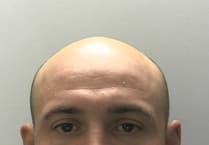A DRUG dealer was found with a crack cocaine factory at his home after being arrested for lockdown breaking during the first Covid outbreak.
Paul Dunlop, who now resides in Newton Abbot, was stopped on the road from Exeter to Topsham on April 28, 2020, at the time of the most severe lockdown restrictions when all non-essential travel was banned.
Police became suspicious because he had a large amount of cash on him and a search of his former home in Burnthouse Lane, Exeter, showed he had been running his own small-scale drug supply business.
His front door was reinforced by a second entry system and he had a pickaxe and extendable baton nearby. Officers found equipment which was being used to convert cocaine into crack inside the flat.
Messages on Dunlop’s phone showed he had been dealing for about two months, during which time more than £10,000 had been paid into his bank account, sometimes in online bank payments from clients.
Dunlop, aged 52, now of Manor Road, Newton Abbot, admitted supplying cocaine, being concerned in the supply of crack, possession of criminal property and possession of a prohibited weapon.
He was jailed for two years, suspended for two years, and ordered to go on a nine months drug rehabilitation course and do 200 hours unpaid community work by Judge Anna Richardson at Exeter Crown Court.
She said she was suspending the sentence because Dunlop has stayed out of trouble and started to address his own drug use during the three years since his arrest.
She ordered an investigation under the Proceeds of Crime Act which is likely to result in the seizure of any assets that can be identified.
She told him: ‘You were stopped by police because of a possible breach of lockdown regulations and, when your car was searched, a large quantity of cash was found. That heightened suspicions, alongside two mobile phones and multiple SIM cards.
‘After your arrest, paraphernalia was recovered which was indicative of the production of crack cocaine as well as the finding of a small amount of cocaine. You were, at least in part, operating to fund your own habit.’
Miss Felicity Payne, prosecuting, said a weapon which combined a baton and a stun gun was recovered from Dunlop’s home but tests by the police armourer showed it could not be charged up.
The double door arrangement at his home was similar to one known as a New York latch which is commonly used by drug dealers. The messages on his phones showed he was providing drugs on credit and arranging direct bank payments.
The phone evidence suggested he discussed deals of an ounce but they did not show which drugs they related to or whether they were actually delivered.
The total amount of unexplained payments that went through his accounts was £10,279.09.
Mr Daniel Pawson-Pounds, defending, said Dunlop had overcome a drug addiction in his 20s and stayed drug free for more than two decades until relapsing after the death of his mother in 2019.
He was selling drugs to support his own habit, which was costing him thousands of pounds a month and absorbing any profit he may otherwise have made.
He said Dunlop played a lesser role because he was not part of a County Lines operation and was running a one-man business rather than exploiting others.




